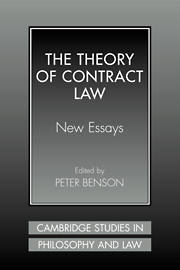Book contents
- Frontmatter
- Contents
- Acknowledgments
- Contributors
- Introduction
- 1 Two Economic Theories of Enforcing Promises
- 2 The Scope and Limits of Legal Paternalism: Altruism and Coercion in Family Financial Arrangements
- 3 Promises and Contracts
- 4 The Unity of Contract Law
- 5 The Theory of Contracts
- 6 Contract Law in the Aristotelian Tradition
- Index
3 - Promises and Contracts
Published online by Cambridge University Press: 05 October 2009
- Frontmatter
- Contents
- Acknowledgments
- Contributors
- Introduction
- 1 Two Economic Theories of Enforcing Promises
- 2 The Scope and Limits of Legal Paternalism: Altruism and Coercion in Family Financial Arrangements
- 3 Promises and Contracts
- 4 The Unity of Contract Law
- 5 The Theory of Contracts
- 6 Contract Law in the Aristotelian Tradition
- Index
Summary
Introduction
The similarity between a promise and a contract is so obvious that it is natural to suppose that there is much to be learned about one of these notions by studying the other, or even that the legal notion of a contract can be understood by seeing it as based on the moral idea of a promise. This article will examine some of the similarities between these two notions. These similarities are due to the fact that contract and promise arise in response to, and are consequently shaped by, some of the same underlying values. They are in this respect parallel ideas. But they respond to these values in different ways and are independent notions, neither of which is properly seen as based on the other.
The law of contracts is clearly a social institution, backed by the coercive power of the state and subject to modification through judicial decisions and legislative enactments. Promising is also often seen as a social institution of a more informal kind, defined by certain rules which are not enacted but rather backed by moral argument and enforced through the informal sanction of moral disapproval. Many have argued that the wrong involved in breaking a promise depends essentially on the existence of a social practice of this kind. Hume, for example, maintains that fidelity to promises is “an artificial virtue,” dependent on the existence of a convention of keeping agreements, and other accounts of this kind have been advanced in our own day by Rawls and others.
- Type
- Chapter
- Information
- The Theory of Contract LawNew Essays, pp. 86 - 117Publisher: Cambridge University PressPrint publication year: 2001
- 13
- Cited by

